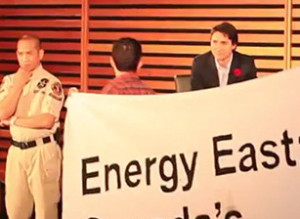Liberal Leader Justin Trudeau took a novel approach to dealing with climate protesters who interrupted an event over the weekend. He encouraged them to speak and listened to what they said.
Source: huffingtonpost.ca/
Author: Michael Bolen
The clip captured at a Toronto library stands in stark contrast with Stephen Harper's reaction to a similar climate protest during an event in British Columbia early this year. When protesters Sean Devlin and Shireen Soofi stormed the stage to call for "climate justice now", the PM stayed silent and allowed his security detail to put a stop to the disturbance.
After they had been removed Harper joked: "It wouldn't be B.C. without it. "
And Harper certainly has skirted protesters in B.C. before, such as during prorogation demonstrations in 2010 when the PM entered the legislature in Victoria in his car via an underground entrance. He later exited by a different door in order to avoid protesters.
Which door the PM uses to enter and exit an event is clearly a matter left to Harper's security detail. And protecting the most powerful person in Canada is important. But it's impossible to fully insulate a prominent politician from protesters (setting aside whether it would be desirable to do so in the first place).
So the question then is how to best deal with protesters once they're in your midst. And it's a question with political implications.
Writing in the Globe and Mail this week, pollster and pundit Bruce Anderson pointed out that having security whisk away dissenters can come off as "arrogant."
"The pictures can be ugly and it can chew up valuable time," he wrote.
Anderson lauded Trudeau for taking a "civilized" approach to the protest, one which left him looking "in control." He contrasted Trudeau's handling of the situation to the way "many Conservatives have sealed themselves off from real, genuine encounters", hoping to "minimize trouble and control the message."
How open Canadian politicians of all stripes are to interacting with the public is likely to be an important issue in the wake of a month that saw two Canadian soldier murdered and gunfire in the halls of Parliament. Security will be top of mind for all the federal leaders.
But as Harper, Trudeau and Thomas Mulcair head into an election campaign, they will need to find a balance between security and openness, between protecting themselves and protecting the freedom to protest.
Original Article
Source: huffingtonpost.ca/
Author: Michael Bolen

No comments:
Post a Comment